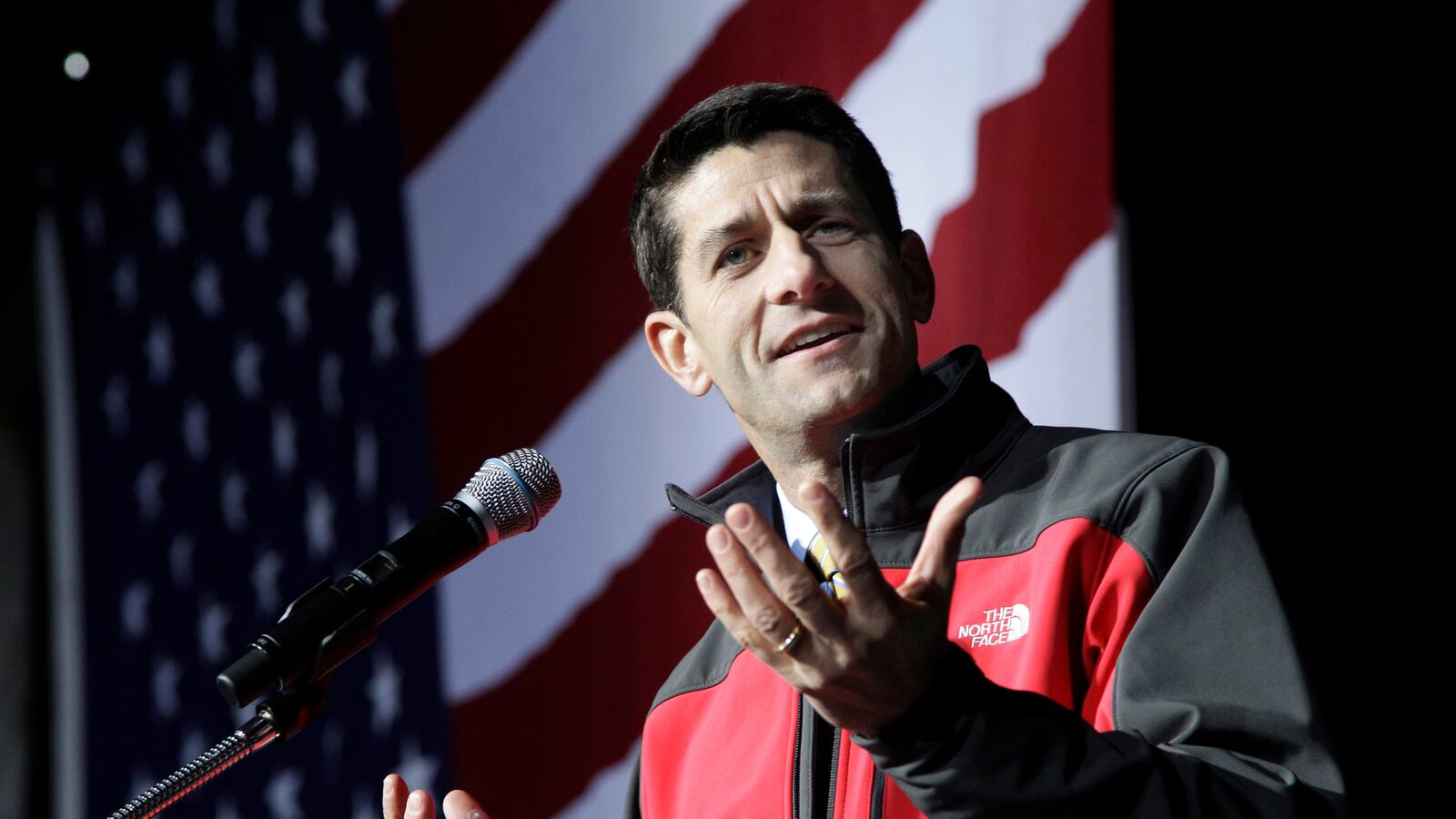After initially marginalizing Rep. Paul Ryan as “a policy wonk” and not the leader of the party, House Speaker John Boehner named Ryan to the GOP team negotiating with the White House on a deal to avoid falling over the fiscal cliff. As chairman of the House Budget Committee, Ryan was a major player before the election and he returns to Congress with his stature enhanced, receiving a standing round of applause on Wednesday morning from his colleagues in the House Republican caucus.
What Ryan will do with his newfound clout is uncertain. Will he uphold his conservative principles, or will he bend in order to reach a compromise that would avert the fiscal cliff? “I think he faces a real choice,” says Rep. Chris Van Hollen, ranking Democrat on the Budget Committee. “Does he want to address the fiscal cliff we face in a bipartisan way, or does he want to rally the flag for the Tea Party wing of the party?”
Ryan can either be a major ally or an obstacle in crafting a grand bargain. He could lead the anti-tax, small-government faithful against a budget settlement, or he could help sell a deal that violates everything he said on the campaign trail. “If he helps reach a compromise, he loses the one issue that he might prefer to keep alive,” says Tom Mann, co-author of It’s Even Worse Than It Looks, an indictment of the current Congress. “No easy path for him,” Mann concludes.
Reading the tea leaves as to which path he will take, Ryan backed conservative favorite Tom Price of Georgia for Republican Conference chairman over the more moderate Kathy McMorris Rodgers of Oregon. Rodgers, backed by Boehner, won. The early skirmish illustrates the ideological divide between the speaker and Ryan, and suggests bigger problems ahead. Ryan has plenty of street cred with conservatives. If he’s prepared to spend some of that in the service of GOP unity, it could pay dividends in expanding his appeal as a national figure. Either way, he will be a major barometer for his party in the months ahead as it attempts to climb out of the electoral hole it dug in this election.
A GOP leadership aide says she has never heard Boehner say anything but “glowing things” about Ryan, but cautions, “His influence in the caucus should not be overestimated.” Boehner is not a natural ally for Ryan, and vice versa. Their interests do not necessarily line up. Boehner needs to forge a budget deal that can bring along enough Republicans that, together with Democratic votes, reaches the required 218 to pass the House. The GOP number could be as few as 30 depending on the nature of the deal and the level of distaste on either side of the aisle.

“The American people gave the president and the House and Senate a huge do-over,” says Brad Blakeman, an alumnus of the Bush White House who teaches public policy at Georgetown University. The division of power is like it was before the election, “but the American people do not want status quo in results,” says Blakeman. This is an opportunity for Ryan, the intellectual leader of the House Republicans, to show his true leadership skills, says Blakeman. “He understands the need for a grand bargain, and he needs to bring along people who need a little cajoling into the deal they make.”
Ryan returns as an unsung hero to House Republicans. They don’t blame him for the loss of the presidency. The budget he crafted and that they voted for in the House was sidelined during the campaign, considered too controversial by the Romney people. Republicans take comfort in the fact that the GOP didn’t lose on the Ryan budget, as Democrats had predicted. But the Ryan budget could become an albatross in the negotiations over the fiscal cliff. “Boehner is not going to go out of his way to make life easy for Ryan. He has no obligation to lay down a pathway for him to the nomination,” says a lobbyist observing the machinations.
Ryan will have to decide how to position himself, knowing that there is both risk and reward in establishing his own power center in the fractious caucus. “If he wants to run for president, he won’t want to embrace any significant tax increase, and then we’re back to the same old standoff,” says Dan Mitchell with the Cato Institute, a libertarian think tank. “If Boehner cuts a deal and has Ryan’s support, that would cut the legs off from under conservative opposition.”
From Mitchell’s perspective, any deal President Obama agrees to has got to be “worse than doing nothing.” But he points out that Ryan voted for TARP, the bailout package for the big banks, the Medicare Part D prescription-drug program for seniors, and all the big spending of the Bush years, so he has proven himself capable of making political calculations that do not align with his professed conservative principles. Ryan has not been pure when it comes to policymaking. No politician is.






